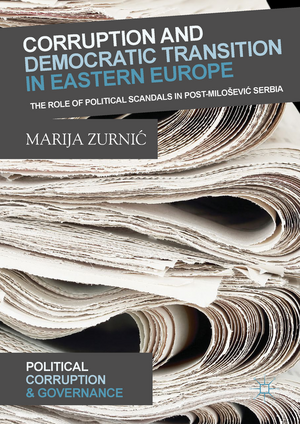Corruption and Democratic Transition in Eastern Europe: The Role of Political Scandals in Post-Milošević Serbia: Political Corruption and Governance
Autor Marija Zurnićen Limba Engleză Hardback – 29 iun 2018
| Toate formatele și edițiile | Preț | Express |
|---|---|---|
| Paperback (1) | 524.36 lei 43-57 zile | |
| Springer International Publishing – 8 feb 2019 | 524.36 lei 43-57 zile | |
| Hardback (1) | 534.04 lei 43-57 zile | |
| Springer International Publishing – 29 iun 2018 | 534.04 lei 43-57 zile |
Din seria Political Corruption and Governance
- 15%
 Preț: 583.61 lei
Preț: 583.61 lei -
 Preț: 385.84 lei
Preț: 385.84 lei -
 Preț: 389.11 lei
Preț: 389.11 lei - 18%
 Preț: 1114.52 lei
Preț: 1114.52 lei - 18%
 Preț: 788.54 lei
Preț: 788.54 lei - 18%
 Preț: 1002.94 lei
Preț: 1002.94 lei -
 Preț: 348.98 lei
Preț: 348.98 lei - 15%
 Preț: 472.36 lei
Preț: 472.36 lei - 15%
 Preț: 580.68 lei
Preț: 580.68 lei - 15%
 Preț: 698.94 lei
Preț: 698.94 lei - 18%
 Preț: 776.09 lei
Preț: 776.09 lei -
 Preț: 354.93 lei
Preț: 354.93 lei - 18%
 Preț: 893.84 lei
Preț: 893.84 lei -
 Preț: 425.80 lei
Preț: 425.80 lei -
 Preț: 324.33 lei
Preț: 324.33 lei - 18%
 Preț: 736.01 lei
Preț: 736.01 lei
Preț: 534.04 lei
Preț vechi: 628.28 lei
-15% Nou
Puncte Express: 801
Preț estimativ în valută:
102.19€ • 106.98$ • 84.55£
102.19€ • 106.98$ • 84.55£
Carte tipărită la comandă
Livrare economică 07-21 aprilie
Preluare comenzi: 021 569.72.76
Specificații
ISBN-13: 9783319901008
ISBN-10: 3319901001
Pagini: 330
Ilustrații: XI, 262 p. 2 illus. in color.
Dimensiuni: 148 x 210 mm
Greutate: 0.6 kg
Ediția:1st ed. 2019
Editura: Springer International Publishing
Colecția Palgrave Macmillan
Seria Political Corruption and Governance
Locul publicării:Cham, Switzerland
ISBN-10: 3319901001
Pagini: 330
Ilustrații: XI, 262 p. 2 illus. in color.
Dimensiuni: 148 x 210 mm
Greutate: 0.6 kg
Ediția:1st ed. 2019
Editura: Springer International Publishing
Colecția Palgrave Macmillan
Seria Political Corruption and Governance
Locul publicării:Cham, Switzerland
Cuprins
1. Introduction: Political Scandals and Transition in Serbia.- 2. Yugoslavia from Kingdom to Socialist Federation: Political Order and Political Corruption.- 3. Milošević’s Rule and Corruption.- 4. Confronting Corruption in Post-Milošević Serbia: Discourse and Institutions.- 5. Money Laundering and Privatisation: The Money in Cyprus Scandal and the Privatisation of Jugoremedija.- 6. State, Interest and Political Corruption: The Bankruptcy of Sartid and the Privatisation of C Market.- 7.Institution-Building and Institutionalised Corruption: The Port of Belgrade Privatisation and Swine Flu Scandals.- 8. Conclusions: Political Scandals and Political Action.
Recenzii
“Zurnić’s book on corruption scandals and institutional change in Serbia after Milošević is a valuable contribution to the discussion about the entanglement of public discourse and institutional change. … her book is therefore a must-read for scholars interested in that country’s transition to democracy, and also in democratic processes more generally, and corruption discourses more specifically.” (Kathrin Jurkat, Südosteuropa Journal of Politics and Society, Vol. 68 (2), 2020)
“The book will appeal to researchers and practitioners who are interested in the matters of corruption and democratic transformation on a broader level. … the book provides a welcome addition to the academic discourse on corruption in Eastern Europe, the political and economic transformation of authoritarian states, and public perceptions of a transition that is ongoing, with no clear end in sight.” (Nina Markovic Khaze, Europe-Asia Studies, Vol. 72 (1), 2020)
Notă biografică
Marija Zurnić is an independent researcher in anti-corruption studies and discourse analysis in Southeast Europe.
Textul de pe ultima copertă
This book examines the relationship between corruption scandals and transitional processes in post-Milošević Serbia after 2000. The study challenges the view that corruption has always been understood as a conflict between private interests and the public good, as these concepts are defined in Western democracies, and explores how anti-corruption discourse has been used for political mobilisation. Through an examination of high-profile political scandals in Serbia, the author shows how the meaning of corruption changed over time. In the early 2000s, corruption focused on the legacy of Milošević’s rule and was identified through the public’s limited access to the privatisation process. By the end of the decade, conceptualisations of corruption in public debate were so diversified that each anti-corruption measure undertaken by the state was interpreted as an act of corruption by other voices in the discourse. The book will appeal to students and scholars interested in corruption studies, discourse analysis and Balkan politics.
Marija Zurnić is an independent researcher in anti-corruption studies and discourse analysis in Southeast Europe.
Caracteristici
Based on the author's fieldwork and media analysis from the region Challenges the view that corruption scandals can only exist in consolidated democracies Introduces a new understanding of corruption based on the separation of private and public political spheres
